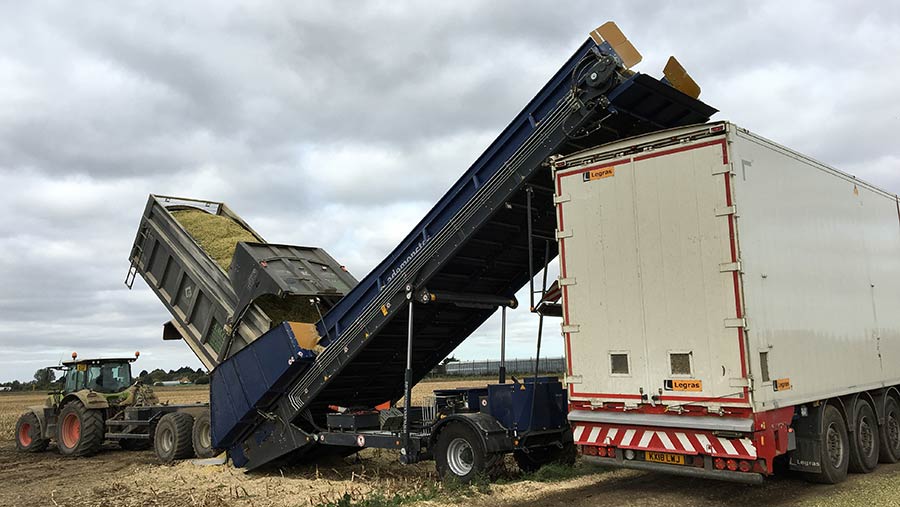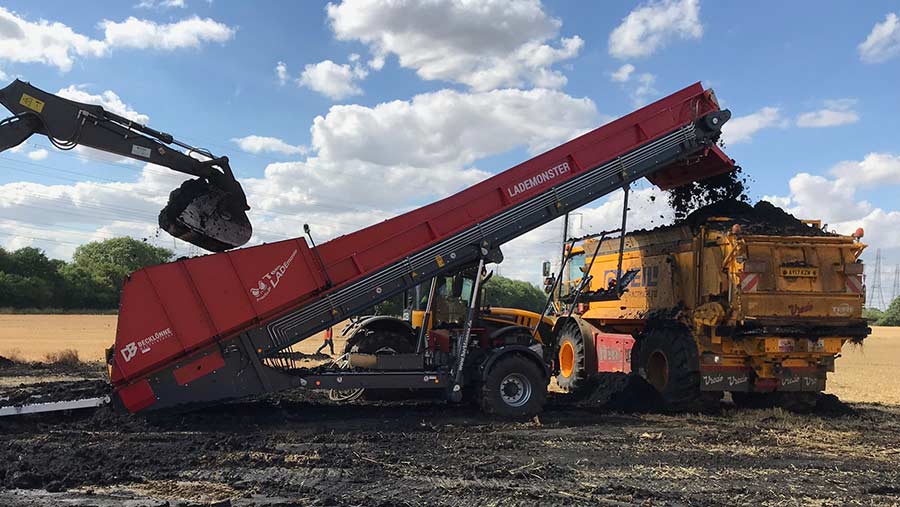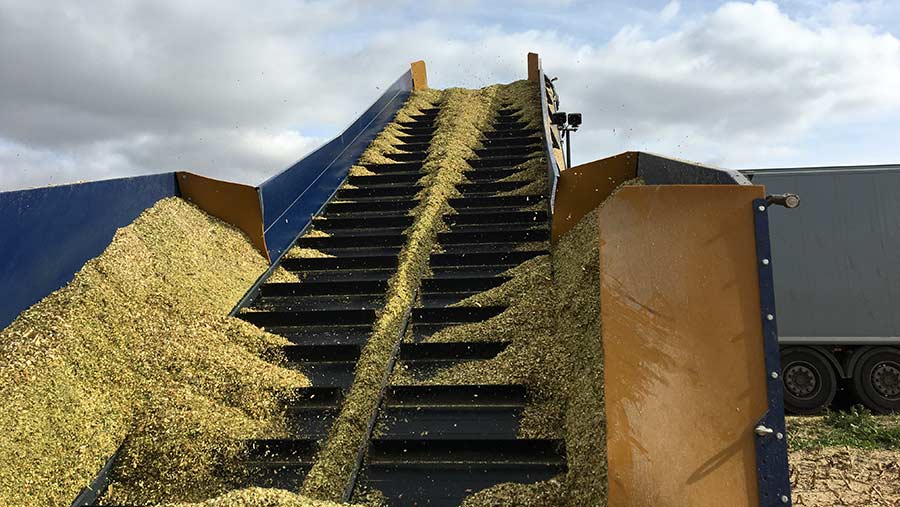Becklonne Lademonster eases maize hauling headache
 © Wigdhal
© Wigdhal Little-known German manufacturer Becklonne has developed a monster elevator designed to shift large quantities of crop from the field to the clamp, and it’s capable of loading an artic bulker in under two minutes.
Becklonne isn’t the first company to introduce a field loader to the UK market – JW Fabrications and Niagri have already had a go – but the company has 20 units already working on the continent and importer Suffolk Farm Machinery has now sold two machines here.
The first is working in Bury St Edmunds and the second is used to load compost and woodchip in Scotland.
See also: How to minimise maize losses as feed supplies tighten
How does it work?
Providing the power is a 90hp Kubota engine fuelled by a 220-litre diesel tank. This drives two conveyors sat side by side, each with a separate chain drive and individual gearbox.
The conveyor is made up of a selection of steel plates with a 1mm gap between each, which allows for a certain amount of flex. Added to that, every fourth plate has a ridge to keep smaller, less bulky materials moving.
To help justify the cost to prospective buyers, Becklonne says the Lademonster can be used to load all sorts of crops including wheat, maize, grass and even biowaste.
However, very small grains such as oilseed rape would slip through the 1mm gaps.
A 12m reach and 6m loading height means it should be able to scale even the unruliest of hedges and drop material straight into waiting lorries or trailers sitting on the roadside with clean wheels.
Output is said to be in the region of 1,500t/hour, although this varies according to the material density.
Operation
There is an option of running the machine from the back of a tractor via a pto shaft, which knocks about £25,000 off the asking price.
However, that will mean clocking up a lot of hours as the tractor sits at 1,200rpm all day.

The PTO-powered version loading biowaste © Carr
All the main functions are controlled remotely, including raising and lowering the elevator, opening and closing the hopper, controlling the flap at the end of the conveyor, and altering the speed of unloading.
Reversing trailers up to the hopper tends to be pretty simple during daylight hours in dry conditions, but is trickier when its muddy and dark.
With that in mind, Becklonne is working on an improved lighting package.
The machine sits on 630mm wide flotation tyres, with a 50kph rated axle and dual air brakes. In-field set-up takes about 10mins.
Prices for the mammoth loader start at about £125,000 for the pto version, or more like £150,000 with an on-board engine.
That includes an autolube system as standard and it can be ordered in any paint colour, too.
Contractor’s viewpoint
OJ Neil Contracting, based in Bury St Edmunds, Suffolk, is the first UK owner of a Lademonster machine and has been busy shifting maize into waiting lorries.
“The days of fleets of tractor and trailers running are numbered,” reckons Richard James, the contractor’s field operations manager.

The conveyor’s ridged metal plates keep looser material moving © Wigdahl
“Cost-wise, a tractor and trailer is £40/hour to rent, while an artic is £60/hour but can carry twice as much. And with greater haul distances, the fuel efficiency of the trucks comes into play.”
Mr James also thinks keeping tractors in the field and adopting a clean transfer of crop to trucks should limit the impact that large maize and root crop haulage operations have on the general public, especially in terms of mud of the road.
Carting with bulkers has prompted OJ Neil to buy a Larrington triple-axle ejector trailer, which replaces two regular trailers as it can fill the artic in one go.
The Lademonster also has benefits when loading biowaste as the four gears allow the excavator to fill the bed and, from stationary, the belt can gradually increase in speed to virtually halve the loading times for the contractor’s Vredo self-propelled spreaders.

